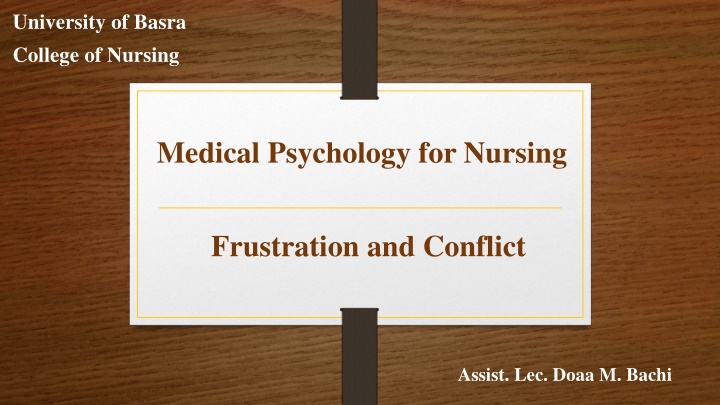
Frustration: Causes, Effects, and Coping Strategies
Explore the concept of frustration, its sources, and effects on mental health. Learn how to manage frustration and its impact on achieving goals. Discover the psychological and physical implications of prolonged frustration.
Download Presentation

Please find below an Image/Link to download the presentation.
The content on the website is provided AS IS for your information and personal use only. It may not be sold, licensed, or shared on other websites without obtaining consent from the author. If you encounter any issues during the download, it is possible that the publisher has removed the file from their server.
You are allowed to download the files provided on this website for personal or commercial use, subject to the condition that they are used lawfully. All files are the property of their respective owners.
The content on the website is provided AS IS for your information and personal use only. It may not be sold, licensed, or shared on other websites without obtaining consent from the author.
E N D
Presentation Transcript
University of Basra College of Nursing Medical Psychology for Nursing Frustration and Conflict Assist. Lec. Doaa M. Bachi
Frustration Frustration: It is an emotion that occurs where a person is blocked from reaching or achieving a desired outcome. Frustration is one of the causes of stress.
In general, whenever we reach one of our goals, we feel pleased and whenever we are prevented from reaching our goals, we may succumb to frustration and feel irritable, annoyed and angry. Typically, the more important the goal, the greater the frustration and resultant anger or loss of confidence. Some frustrations are minor e.g. busy signals, traffic slowdowns, late arrivals. Students can also be frustrated over exam pressure, peer pressure and pressure from parents to perform well in exams
Sources or Causes of Frustration Needs can be blocked two different ways; internally and externally. 1. Internal (personal) blocking happens within an individual's mind, either through lack of ability, confidence, conflicting goals and desires, and/or fears, mental deficiency. 2. External blocking happens to an individual outside their control. a. b. c. d. environmental - Natural calamities, workplace environment. Social factors: norms and rules of society. Economics factors: poverty, wage, corruption Others: difficult tasks, or perceived waste of time
What Can Be the Effects of Frustration? 1. When someone is frustrated, the most typical reaction is anger. This is an emotional reaction usually directed at the obstacle. 2. When the obstacle is too influential to direct anger at, this anger is frequently redirected to something less influential. 3. As achievement of a specific goal is repeatedly thwarted, many people gradually succumb to a loss of confidence.
4. Some people who continue to be frustrated in their attempts to achieve their goals become depressed. 5. Their body goes into fight-or-flight mode when they can neither fight the pressure nor flee it. Frustration causes headaches, stomach aches, hypertension, anxiety, ulcers and even heart attacks. 6. Others who are continually frustrated develop depression, which affects every facet of one's daily life.(suicide)
Management of Frustration Do something pleasant Breathing exercises Meditation practice Communications skills Physical exercise Relaxation activities Learning how to release emotion Psychological counseling or therapy
Conflict Conflict is an activity which takes place when individuals or groups wish to carry out mutually inconsistent acts concerning their wants, needs or obligations Conflicts can occur between individuals, groups and organizations
Levels of Conflict 1. Intrapersonal (within an individual). 2. Interpersonal (between individuals). 3. Intragroup (within a group). 4. Intergroup (between groups) 5. Intraorganizational(within organizations)
Types of Conflict Frustration 1. Approach Avoidance Conflict: We both want and don t want something. Example: Any temptations, like sweets, we want to avoid it.
2. Approach Approach Conflict: You have two or more good choices but you can t have them both. Example: 1. You have two good job offer.
3. Conflict: We have two or more alternatives but none of them seems desirable. Example: 1. Studying hard a boring chapter or fail at the exam tomorrow. Avoidance Avoidance
4. Approach Avoidance Conflict: We are faced with many choices, each with complex positive and negative aspects. Example: 1. There is a good movie on. (but you might flunk a quiz tomorrow) Double or Multiple
Psychological Defense Mechanisms refers unconscious that protect a person against anxiety distorting some way to the processes by in reality
Psychological Defense Mechanisms I. Denial is one of the most common defense mechanisms. It occurs when you refuse to accept reality or facts.
II. Withdrawal: Behaviours such as asking for a transfer or quitting a job. III. Fixation: An employee blames others and superiors for his problems, without knowing complete facts. IV. Aggression: Acting in a threatening manner.
VI.Regression: Behaving in an immature and childish manner and may self- pity (to feel sorry for oneself). VII.Rationalization: Some people may attempt to explain undesirable behaviors with their own set of facts. VIII.Sublimation: This type of defense mechanism is considered a positive strategy. IX.Reaction formation: People who use this defense mechanism recognize how they feel, but they choose to behave in the opposite manner of their instincts. X. Physical Disorder: Physical ailments such as fever, upset stomach, vomiting, etc. XI.Apathy: Becoming irresponsive and disinterested in the job and his co- workers.
